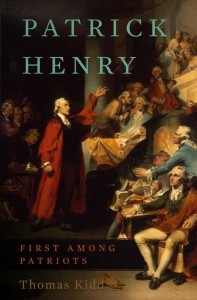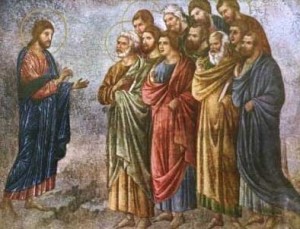VATICAN CITY, 1 FEB 2012 (VIS) – This morning in the Paul VI Hall the Holy Father received thousands of pilgrims from around the world in his weekly general audience. As part of a series of catecheses dedicated to the prayers pronounced by Christ, he focused his remarks on Jesus’ prayer in the Garden of Gethsemane.
Mark the Evangelist narrates how, following the Last Supper, Jesus went to the Mount of Olives and readied Himself for personal prayer. “But this time”, the Pope said, “something new occurred; it seemed that He did not want to remain alone. Many times in the past Jesus had moved away from the crowds, even from His own disciples. … However, in Gethsemane he invited Peter, James and John to stay close by; the same disciples who had accompanied Him during the Transfiguration.
“The proximity of these three during the prayer at Gethsemane is significant”, Benedict XVI added. It represents “a request for solidarity at the moment in which He felt the approach of death. Above all it was a closeness in prayer, an expression of unity with Him at the moment in which He was preparing to accomplish the Father’s will to the end, an invitation to all disciples to follow Him on the path of the Cross”.
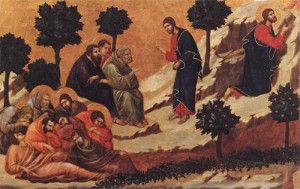 Jesus’ words to the three disciples – “I am deeply grieved, even to death; remain here and keep awake” – show that He was feeling “fear and anguish at that ‘Hour’, experiencing the ultimate profound solitude as God’s plan was being accomplished. Jesus fear and anguish comprehend all the horror that man feels at the prospect of his own death, its inexorable certainty and the perception of the burden of evil which affects our lives”.
Jesus’ words to the three disciples – “I am deeply grieved, even to death; remain here and keep awake” – show that He was feeling “fear and anguish at that ‘Hour’, experiencing the ultimate profound solitude as God’s plan was being accomplished. Jesus fear and anguish comprehend all the horror that man feels at the prospect of his own death, its inexorable certainty and the perception of the burden of evil which affects our lives”.
Having invited His disciples to keep awake, Jesus moved away from them. Referring to the Gospel of St. Mark, the Pope noted that Jesus “threw Himself to the ground: a position for prayer which expresses obedience to the Father’s will, an abandonment of self with complete trust in Him”. Jesus then asks the Father that, if possible, the hour might pass from Him. “This is not just the fear and anguish of man in the face of death”, the Holy Father explained, “but the distress of the Son of God Who sees the terrible accumulation of evil He must take upon Himself, in order to overcome it and deprive it of power”.
In this context, Benedict XVI invited the faithful to pray to God, placing before Him “our fatigue, the suffering of certain situations and of certain days, our daily struggle to follow Him and to be Christians, and the burden of evil we see within and around us, that He may give us hope, make us aware of His closeness and give us a little light on life’s journey”.
Returning then to Jesus’ prayer, the Pope focused on “three revealing passages” in Christ’s words: “Abba, Father, for you all things are possible; remove this cup from me; yet, not what I want but what you want”. Firstly, Benedict XVI said, the Aramaic word “Abba” is used by children to address their fathers, “therefore it express Jesus relationship with God the 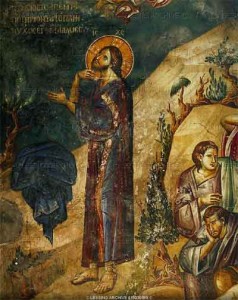 Father, a relationship of tenderness, affection and trust”. Secondly, Jesus’ words contain an acknowledgment of the Father’s omnipotence “introducing a request in which, once again, we see the drama of Jesus’ human will in the face of death and evil. … Yet the third expression … is the decisive one, in which the human will adheres fully to the divine will. … Jesus tells us that only by conforming their will to the divine will can human beings achieve their true stature and become ‘divine’. … This is what Jesus does in Gethsemane. By transferring human will to the divine will the true man is born and we are redeemed”.
Father, a relationship of tenderness, affection and trust”. Secondly, Jesus’ words contain an acknowledgment of the Father’s omnipotence “introducing a request in which, once again, we see the drama of Jesus’ human will in the face of death and evil. … Yet the third expression … is the decisive one, in which the human will adheres fully to the divine will. … Jesus tells us that only by conforming their will to the divine will can human beings achieve their true stature and become ‘divine’. … This is what Jesus does in Gethsemane. By transferring human will to the divine will the true man is born and we are redeemed”.
When we pray the Our Father “we ask the Lord that ‘your will be done, on earth as it is in heaven’. In other words, we recognise that God has a will for us and with us, that God has a will for our lives and, each day, this must increasingly become the reference point for our desires and our existence. We also recognise that … ‘earth’ becomes ‘heaven’ – the place where love, goodness, truth and divine beauty are present – only if the will of God is done”.
In our prayers “we must learn to have greater trust in Divine Providence, to ask God for the strength to abandon our own selves in order to renew our ‘yes’, to repeat to Him ‘your will be done’, to conform our will to His. This is a prayer we must repeat every day, because it is not always easy to entrust oneself to the will of God”.
The Gospel says that the disciples were unable to remain awake for Christ, and Pope Benedict concluded his catechesis by saying: “Let us ask the Lord for the power to keep awake for Him in prayer, to follow the will of God every day even if He speaks of the Cross, to live in ever increasing intimacy with the Lord and bring a little of God’s ‘heaven’ to this ‘earth'”.
Following the catechesis the Holy Father delivered greetings in a number of languages to the pilgrims filling the Paul VI Hall. They included a group of British military chaplains, faithful from Hong Kong and South America, bishops friends of the Sant’Egidio Community from Europe, Asia and Africa, as well as young people and the sick.
AG/ VIS 20120201 (940)
 homes too). Marge Fenelon covers every corner of our busy and active households and helps us to create (with God’s grace) healthy holy homes! She tackles real life issues – money, time, technology and everything that touches our lives today – and shows in practical, concrete ways how families foster and nurture “saints in the making”.
homes too). Marge Fenelon covers every corner of our busy and active households and helps us to create (with God’s grace) healthy holy homes! She tackles real life issues – money, time, technology and everything that touches our lives today – and shows in practical, concrete ways how families foster and nurture “saints in the making”.



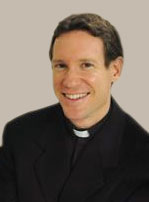
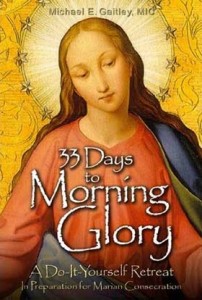
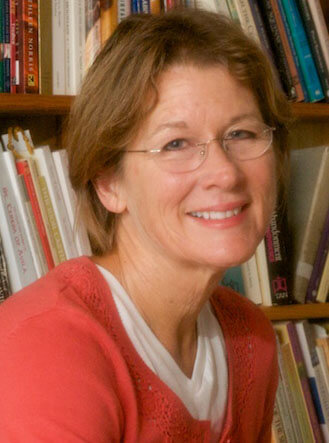
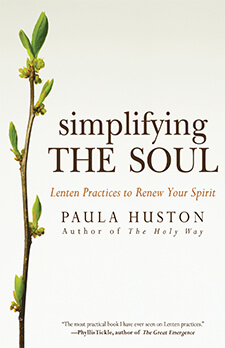
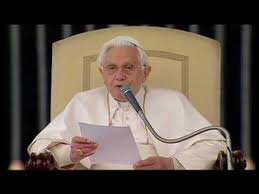
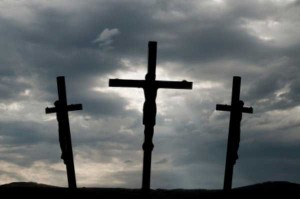
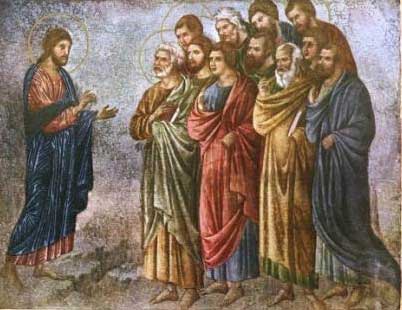
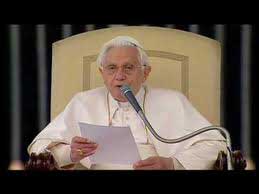


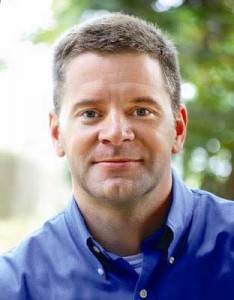
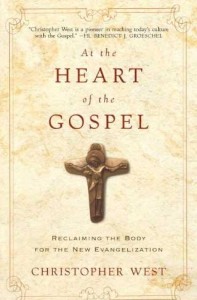
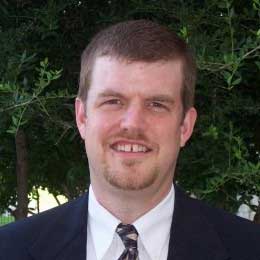 with Dr. Thomas Kidd is an important one. Dr. Kidd gives us the life and passionate thought of “Patrick Henry: First Among Patriots”. Patrick Henry gave us the great rallying cry “Give me Liberty or Give me Death”, and yet many of us may not realize that he had huge reservations about the scope of the Constitution, because he feared it could one day seize that liberty and destroy it if allowed to go unchecked….very interesting. I found this to be a fascinating book. Would Patrick Henry’s concern turn out to be a prophetic one? Dr. Thomas Kidd handles his subject well, and presents the time, place and overall personality of Henry with clarity and insight in a very compelling read.
with Dr. Thomas Kidd is an important one. Dr. Kidd gives us the life and passionate thought of “Patrick Henry: First Among Patriots”. Patrick Henry gave us the great rallying cry “Give me Liberty or Give me Death”, and yet many of us may not realize that he had huge reservations about the scope of the Constitution, because he feared it could one day seize that liberty and destroy it if allowed to go unchecked….very interesting. I found this to be a fascinating book. Would Patrick Henry’s concern turn out to be a prophetic one? Dr. Thomas Kidd handles his subject well, and presents the time, place and overall personality of Henry with clarity and insight in a very compelling read.